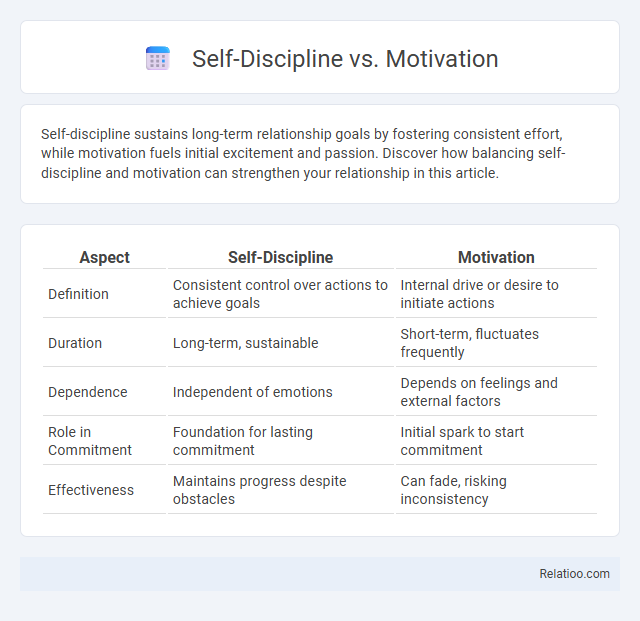Self-discipline sustains long-term relationship goals by fostering consistent effort, while motivation fuels initial excitement and passion. Discover how balancing self-discipline and motivation can strengthen your relationship in this article.
Table of Comparison
| Aspect | Self-Discipline | Motivation |
|---|---|---|
| Definition | Consistent control over actions to achieve goals | Internal drive or desire to initiate actions |
| Duration | Long-term, sustainable | Short-term, fluctuates frequently |
| Dependence | Independent of emotions | Depends on feelings and external factors |
| Role in Commitment | Foundation for lasting commitment | Initial spark to start commitment |
| Effectiveness | Maintains progress despite obstacles | Can fade, risking inconsistency |
Understanding Self-Discipline and Motivation
Understanding self-discipline involves recognizing it as the consistent practice of controlling impulses to achieve long-term goals, while motivation is the emotional drive that sparks initial action. Self-discipline sustains behavior when motivation fluctuates, ensuring progress through habits and deliberate effort. Effective personal growth combines motivation's energy with self-discipline's persistence to overcome challenges and maintain focus.
Key Differences Between Self-Discipline and Motivation
Self-discipline is the ability to maintain consistent actions toward goals regardless of emotional fluctuations, whereas motivation is the emotional drive that initiates and sustains goal-directed behavior. Self-discipline relies on willpower and routine, enabling progress even when motivation wanes, while motivation is often temporary and influenced by external or internal stimuli. Understanding the distinction helps in developing long-term habits through self-discipline rather than depending solely on motivation's variable intensity.
The Role of Self-Discipline in Achieving Goals
Self-discipline is essential for achieving long-term goals because it provides the consistent effort and perseverance that motivation alone cannot sustain. Your ability to maintain self-discipline enables you to stay on track and overcome obstacles, ensuring progress even when motivation wanes. Developing strong self-discipline helps transform ambitions into measurable success by fostering habits that drive continuous action toward your objectives.
How Motivation Drives Human Behavior
Motivation acts as the initial spark that drives human behavior, creating an intrinsic desire to achieve goals and fulfill needs. It energizes actions by linking outcomes to emotional rewards, which reinforces persistence and effort in tasks. While self-discipline sustains behavior through consistent routines and control, motivation is essential for initiating the drive and fostering engagement in activities.
When Motivation Fades: The Power of Discipline
When motivation fades, self-discipline ensures consistent progress by enforcing routines and habits that transcend temporary emotions. Your ability to maintain focus through disciplined actions directly impacts long-term success, outperforming reliance on fleeting motivation. Self-discipline creates a resilience that sustains productivity and goal achievement even during challenging times.
Building Sustainable Habits: Discipline vs Motivation
Building sustainable habits hinges more on self-discipline than fleeting motivation, as discipline creates consistent routines that drive long-term progress regardless of emotional fluctuations. Motivation may spark initial interest, but self-discipline ensures you maintain focus and resilience when enthusiasm wanes. Your ability to develop discipline establishes a reliable foundation for lasting behavioral change beyond temporary inspiration.
Real-Life Examples: Self-Discipline vs Motivation
Self-discipline drives consistent actions toward long-term goals, as seen in athletes who train daily despite lacking motivation. Motivation often fluctuates, inspired by emotions or external rewards, such as a student studying hard before exams but slacking off afterward. Successful entrepreneurs exemplify self-discipline by maintaining routines and productivity regardless of temporary motivational boosts or dips.
Strategies to Strengthen Self-Discipline
Strengthening self-discipline requires consistent practice of goal-setting, creating structured routines, and minimizing distractions to build resilience against momentary urges fueled by motivation alone. You can enhance willpower by breaking tasks into smaller, manageable steps and using rewards strategically to reinforce positive behavior. Developing mindfulness and regularly reviewing progress helps maintain focus and adapt strategies for sustained self-control beyond fluctuating motivation.
Ways to Boost Daily Motivation
Boosting daily motivation involves establishing clear goals that align with personal values, creating a structured routine, and celebrating small accomplishments to maintain momentum. Implementing techniques like visualization, positive affirmations, and surrounding oneself with inspiring environments can enhance intrinsic motivation throughout the day. Consistent practice of self-discipline reinforces motivation by transforming intentions into habitual actions, ensuring sustained progress toward long-term objectives.
Finding Balance: Integrating Motivation and Discipline for Success
Self-discipline provides consistent structure to achieve goals, while motivation fuels the initial drive and enthusiasm necessary for starting tasks. Balancing these elements involves cultivating disciplined habits that maintain progress during periods of low motivation and leveraging motivation to energize efforts when discipline wanes. Successful individuals integrate motivation with self-discipline to sustain focus, optimize productivity, and ensure long-term achievement.

Infographic: Self-discipline vs Motivation
 relatioo.com
relatioo.com